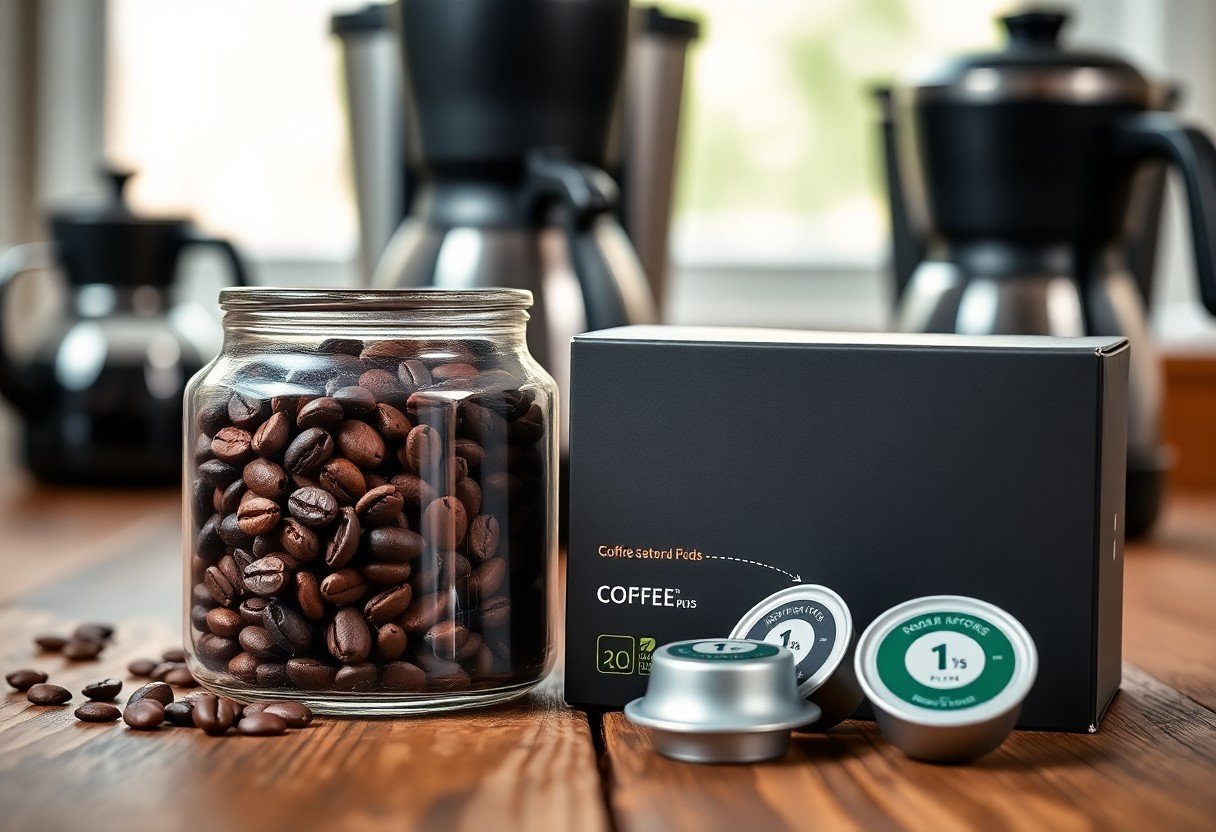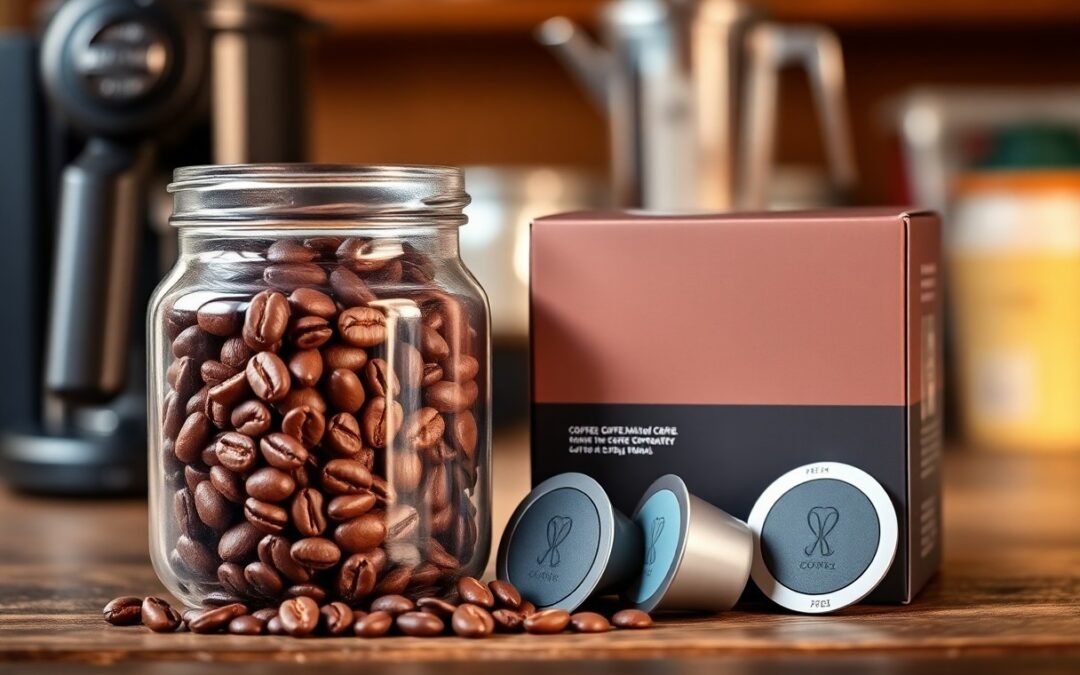Coffee lovers face the age-old debate of coffee beans versus coffee pods for their daily brew. By understanding the differences between these two options, you can make an informed decision that caters to your taste, convenience, and brewing style. In this guide, we will explore the pros and cons of each method, helping you choose the right one to elevate your coffee experience. Let’s explore the key factors that will influence your brewing process and flavor profile, ensuring that every cup you enjoy meets your expectations.

The Flavor Face-Off: Coffee Beans vs. Coffee Pods
The debate between coffee beans and coffee pods comes down to a variety of factors that impact the flavor and quality of your brew. Each option has unique elements that can either elevate your coffee experience or detract from it. By understanding the differences in freshness, aroma, and brewing techniques, you’ll be better equipped to choose the right option for your palate.
The Taste Experience: Freshness and Aroma
Freshness significantly influences coffee’s aroma and flavor, which is why many enthusiasts swear by whole beans. When you grind coffee beans just before brewing, you’re releasing oils and compounds that contribute to the rich and complex flavors of your drink. In contrast, coffee pods often contain pre-ground coffee, which may have already lost some of its crucial oils and aromas, leading to a less vibrant cup.
Brewing Techniques: Methods and Their Impact
Your brewing method plays a pivotal role in determining the final taste of your coffee. With coffee beans, you have the flexibility to experiment with various brewing techniques, such as French press, pour-over, or espresso, allowing for greater control over extraction time and temperature. On the other hand, coffee pods typically limit you to pre-determined brewing profiles designed for convenience, which can result in a more uniform but often less rich flavor.
By using coffee beans, you can fine-tune your brewing method to match your taste preferences. For instance, a French press gives a full-bodied taste, while a pour-over offers clarity. Adjusting factors like grind size, water temperature, and brewing time can dramatically change the coffee’s character. Coffee pods, while convenient, standardize the process, which may limit your ability to customize the brewing parameters. This means less control over the flavor profile, which could be a deciding factor for true coffee aficionados seeking that perfect cup.
Cost Analysis: Long-term Value of Your Brew
Analyzing the costs associated with coffee beans and coffee pods requires a close look at both initial investments and ongoing expenses. While your preference may lean towards convenience or flavor, understanding the long-term financial implications of each choice can significantly affect your overall coffee experience. Whether you brew one cup a day or indulge in multiple servings, the calculation of daily brew expenses will provide you with insights into which option offers the best value over time.
Initial Investment: Buying Coffee Beans vs. Pods
When weighing your options, consider the difference in initial investments. Investing in coffee beans typically involves purchasing a grinder and possibly a more elaborate brewing system, which can range in cost from $50 to over $500, depending on your preferences. In contrast, coffee pods come with a lower upfront expense, often requiring only a single-serve coffee maker, which may cost between $30 and $200. While the initial cost of coffee pods is lower, the ongoing costs should also be taken into account.
Cost Per Cup: Calculating Daily Brew Expenses
To accurately determine the cost per cup, compare the price of coffee beans versus pods. On average, a pound of coffee beans costs around $10 to $20, yielding approximately 48 cups depending on your brew strength. That translates to about $0.20 to $0.42 per cup. Coffee pods, however, often retail for around $0.50 to $1.00 per pod. If you brew one cup daily, the annual expense of coffee beans may considerably undercut that of single-use pods, particularly if you are a daily coffee consumer.
For instance, if you drink one cup of coffee daily using beans, your yearly cost could round out to $72 to $168, depending on the type of beans you purchase. On the other hand, using coffee pods at an average cost of $0.75 each can lead to an annual output of nearly $274.50. These numbers reveal how opting for coffee beans not only saves money in the long run but can also allow you to enjoy a fresher and more customizable brewing process.
Convenience vs. Customization: What Suits Your Lifestyle?
Understanding what suits your lifestyle is central to choosing between coffee beans and coffee pods. If you thrive on convenience and speed, pods may be your best bet, allowing you to brew your favorite coffee in record time. However, if you embrace the art of coffee-making and relish the personal touch of grinding and brewing your own beans, then investing in high-quality coffee beans may align better with your passion for crafting the perfect cup. Explore more about how different brewing methods could elevate your coffee experience at What Coffee-Brewing Method Makes the Best-Tasting Cup?.
On-the-Go Solutions: Ease of Use with Pods
Coffee pods have revolutionized the morning routine for many, offering an unparalleled level of convenience. With pre-measured doses, you don’t have to worry about scooping or grinding; just pop a pod into your machine and hit brew. The process is swift and mess-free, making it ideal for busy individuals who prioritize speed without sacrificing flavor. Whether you’re dashing out the door or prepping for a long day, these pods ensure that a quality cup of coffee is always within arm’s reach.
Crafting Your Perfect Brew: The Art of Grinding Beans
Grinding your own coffee beans unlocks a world of flavor that pre-packaged pods simply can’t match. By controlling the grind size, you can tailor each cup to the brewing method you are using—finer grinds suit espresso machines while coarser grinds work best for French presses. Freshly ground beans release their oils and aromas, contributing to a richer, more complex brew. Consider investing in a burr grinder, as it provides a consistent grind size, which is important for achieving the best flavor extraction during brewing.
Environmental Impact: Sustainability in Your Coffee Choice
Your choice of coffee can significantly contribute to environmental sustainability. Coffee beans, especially those that are certified organic or fair trade, often have a smaller eco-footprint compared to coffee pods, primarily due to the latter’s disposable nature. The production practices behind your coffee can influence soil health, water use, and carbon emissions, meaning every cup you brew reflects your values on environmental stewardship.
The Eco-Footprint: Packaging and Waste Comparison
| Coffee Beans | Coffee Pods |
|---|---|
| Minimal packaging, often recyclable. | Typically single-use and harder to recycle. |
| Less per-cup waste generated. | Contributes significantly to landfill waste. |
| Can be purchased in bulk, reducing packaging needs further. | Individual packaging increases overall waste. |
Ethical Consumption: Sourcing Coffee Responsibly
Choosing coffee sourced responsibly directly impacts the environment and communities involved in coffee production. By selecting beans from farms that prioritize sustainable farming methods, you support practices that protect ecosystems, promote biodiversity, and ensure fair labor conditions for farmers. Certifications such as Fair Trade, Rainforest Alliance, or Organic can guide you in making ethical purchasing decisions, creating a positive ripple effect from your cup to the global coffee community.
Connecting with ethical sourcing practices enhances your coffee experience. Knowing that your coffee supports small-scale farmers reduces inequality and promotes sustainable agriculture creates a deeper appreciation for your brew. Many companies source their beans directly and transparently, allowing you to trace where your coffee originated. This ethical commitment not only fosters better quality coffee but builds relationships that respect the environment and empower those who grow it.
Expert Recommendations: Making an Informed Choice
Evaluating the best option for your brew involves insights from both professionals and consumer preferences. Baristas and experts recommend considering factors like your brewing habits, taste preferences, and the overall experience you desire. If you frequently enjoy fresh, full-bodied coffee, investing in high-quality beans and grinders may delight your palate. For those who prioritize convenience without compromising much on quality, pods could be the ideal answer, allowing you to enjoy a quick yet satisfying cup.
Barista Insights: Professional Opinions on Brewing
Baristas often emphasize freshness as a key factor in brewing quality coffee. They recommend using whole beans, grounding them just before brewing to preserve vital oils and flavors. Expert brewers may suggest exploring single-origin beans to appreciate diverse flavor notes, while acknowledging that pods have made strides in quality, they generally advocate for the superior taste found in freshly brewed coffee from beans.
Consumer Trends: What Coffee Lovers Prefer
Over recent years, consumer trends have illustrated a growing preference for coffee beans, driven by an increasing interest in artisanal coffee and the craft of brewing at home. While convenience remains a significant factor, many coffee aficionados are seeking richer flavors and unique profiles only obtainable from freshly ground beans.
Market research indicates that approximately 65% of coffee drinkers express a preference for whole beans over pods, citing taste quality as the primary reason. The rise in specialty coffee shops and brewing equipment sales reflects this trend, with consumers willing to invest in tools that enhance their brewing experience. Moreover, as sustainability becomes an vital concern, many are drawn to reusable coffee pods or eco-friendly beans, influencing their purchasing decisions towards sustainable options without sacrificing flavor.
Summing up
With these considerations, you can make an informed choice between coffee beans and coffee pods to enhance your brewing experience. Evaluate your preferences for convenience, flavor, and environmental impact to determine what works best for you. Whether you opt for the rich, customizable taste of freshly ground beans or the quick, hassle-free nature of pods, your selection will ultimately shape your coffee rituals and satisfaction. Take the time to explore both options, ensuring your daily cup reflects your unique taste and lifestyle.
FAQ
Q: What are the main differences between coffee beans and coffee pods?
A: Coffee beans are the raw form of coffee that you can grind yourself, typically resulting in a fresher flavor and aroma. They come in various styles, including whole bean and ground. In contrast, coffee pods, also known as coffee capsules, are pre-packaged servings of coffee that are sealed for freshness and designed for specific machines. Pods provide convenience and consistency in flavor, but they may not offer the same depth of taste as freshly ground beans. Additionally, beans give you more control over the grind size and brewing process.
Q: What factors should I consider when choosing between coffee beans and coffee pods?
A: When deciding between coffee beans and pods, consider factors such as convenience, freshness, cost, and environmental impact. If you prioritize ease of use, coffee pods may be the way to go as they simplify brewing with minimal cleanup. However, if you want the freshest taste and greater flexibility in preparation, coffee beans are ideal. Cost can also vary; beans may have a lower price per cup but involve an initial investment in a grinder and potentially a coffee maker. Lastly, think about the environmental aspects; some coffee pods generate waste, while beans can be more sustainable, especially if you purchase them in bulk.
Q: How does the taste differ when using coffee beans versus coffee pods?
A: The taste of your brew can vary significantly depending on whether you use coffee beans or coffee pods. Freshly ground coffee beans usually produce a richer and more complex flavor, as grinding just before brewing helps to preserve the vital oils and aromas. On the other hand, coffee pods, while convenient, may not provide the same intensity of flavor since they are often pre-ground and sealed, potentially leading to a less fragrant coffee experience. However, high-quality pods can still yield a satisfying cup. Personal preference plays a large role, so it can be worthwhile to try both methods to discover what you enjoy most.

